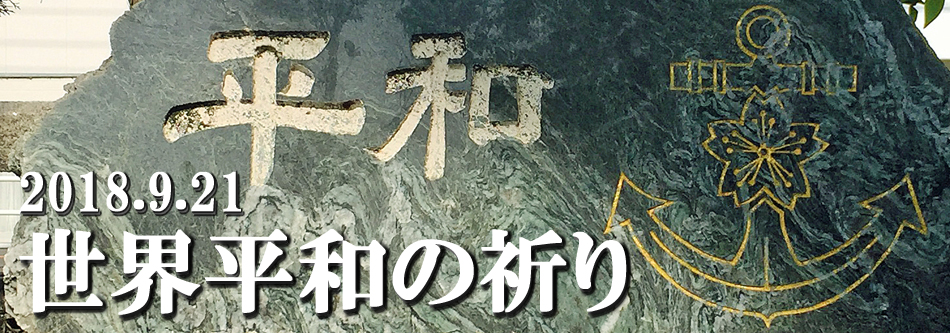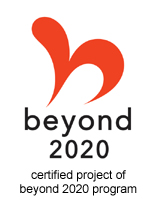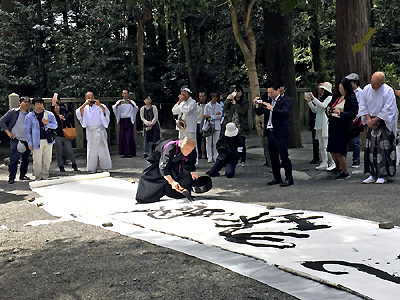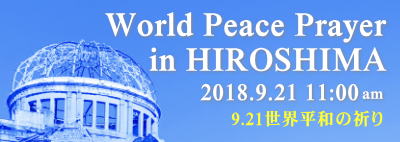 |

World Peace Prayer at Gokoku Shrine on September 21, 2018
KIGO held by a Japanese calligrapher
We will be waiting to meet you at KIGO sites, to pray for world peace with
all of you.
Administration fee is free./ No advanced reservation is required.
Organization: WA Project TAISHI
|
|
|
 About us About us |
| “WA Project TAISHI” is a volunteer-based non-profitable
organization to achieve peace throughout the world by introducing Japanese
traditional culture both at home and abroad. |
|
|
|
 What is KIGO? What is KIGO? |
Sekijyo-KIGO, commonly known as “Calligraphy Performance”
performed by a Calligrapher in front of an audience is a traditional Japanese
Spiritual Culture similar to Zen. When the calligrapher writes a word,
phrase or wish chosen from their heart on a large paper, the audience’s
attention gathers towards the Calligrapher’s appearance and the tip of
their brush. Just like a conductor in an orchestra putting together a symphony,
a Calligrapher makes everyone’s feelings come together, which strengthens
the feelings of prayer. This times opportunity will make everyone’s mind
look towards world peace, harmony of the world, and the tolerance of spirit.
A Calligrapher wearing Kimono will write a message of world peace and Wa
Spirit.
|

< MOVIE > |
|
|
 Gokoku Shrine Gokoku Shrine |
Japanese Shinto is based around nature worship, similar
to the religious outlook of Celtic people, Native Americans, Aborigines,
and Hawaiians. The thinking is not merely about revering nature but learning
the way of life and the way of the heart from nature. Japanese people believe
that the truth of the universe is in nature.
Japanese shrines are dedicated to KAMI, a Japanese
name for God. However for Japanese, KAMI is not identical to GOD in English.
KAMI means all kinds of things that they think they cannot even come close
to. Natural energy such as wind and thunder, ancestors, the souls of the
dead, evil spirits, GOD in Christianity, and Allah in Islam are all KAMI.
Japanese people have enshrined such beings as KAMI at shrines sometimes
to worship, and sometimes to mourn.
At Gokoku Shrine, the war dead soldiers who fought
to protect their home, and policemen and fire fighters who have died while
on duty are consoled as KAMI. There are some that exhibit weapons, but
that is to exhibit them as historical records, never to affirm war.
Most of the KAMI in Gokoku Shrine were young people
who would not have had died if it had not been for war. The deepest wish
of those soldiers killed in the war and of the visitors to the shrine is
world peace. Among Japanese shrines, Gokoku Shrine is therefore a shrine
to pray for peace.
September 21st is the International Day of Peace established
by the United Nations. On that day, we would like both Japanese people
and people from other countries to pray for world peace together at Gokoku
shrine.
|
|
|
 Venue Venue |
| |
updated on 9/12
| Shrine |
City & Map |
Calligrapher |
Start time |
| Sapporo Gokoku |
Sapporo |
YAMADA Kiun |
09 : 30 |
| Hokkaido Gokoku |
Asahikawa |
TAKAHAMA Wataru |
13 : 30 |
| Yamagata Gokoku |
Yamagata |
KAMEI Tsutomu |
10 : 00 |
| Iwate Gokoku |
Morioka |
MATSUMOTO Hirofumi |
10 : 00 |
| Akitaken Gokoku |
Akita |
MATSUDA Ransyu |
11 : 00 |
| Aomoriken Gokoku |
Hirosaki |
TSUSHIMA Rikako |
11 : 00 |
| Chibaken Gokoku |
Chiba |
YANO Kafu |
15 : 00 |
| Saitamaken Gokoku |
Saitama |
WATANABE Daigo |
14 : 30 |
| Gunmaken Gokoku |
Takasaki |
NAGATA Kanoh |
10 : 00 |
| Tochigiken Gokoku |
Utsunomiya |
ONOZAKI Keita |
10 : 00 |
| Ibarakiken Gokoku |
Ibaraki |
AZUMA Sokyu |
13 : 00 |
| Yamanashiken Gokoku |
Kofu |
KUWANA Ryuki |
14 : 00 |
| Shizuokaken Gokoku |
Shizuoka |
SHIRATORI Kinryo |
11 : 00 |
| Aichiken Gokoku |
Nagoya |
HANATANI Kourei |
10 : 30 |
| Gifu Gokoku |
Gifu |
IMASE Harumi |
11 : 30 |
| Hida Gokoku |
Takayama |
SHIMADA Sumi / Eigetsu |
13 : 30 |
| Naganoken Gokoku |
Matsumoto |
WAKABAYASHI Shisyu |
13 : 30 |
| Mieken Gokoku |
Tsu |
ITO Junichi |
11 : 00 |
| Niigataken Gokoku |
Niigata |
SHIMODA Saisui |
14 : 00 |
| Ishikawa Gokoku |
Kanazawa |
ABE Hojyu / Jyusetsu 23 |
14 : 00 |
| Fukuiken Gokoku |
Fukui |
JYAKURIN |
13 : 00 |
| Shigaken Gokoku |
Hikone |
KANDA Kozan |
11 : 00 |
| Kyoto Ryozen Gokoku |
Kyoto |
TAKEMOTO Daiki |
13 : 00 |
| Osaka Gokoku |
Osaka |
MOTOYAMA Yuko |
10 : 00 |
| Hyogoken Kobe Gokoku |
Kobe |
ARAI Houyo |
10 : 00 |
| Hyogoken Himeji Gokoku |
Himeji |
MUKAI Takumi |
15 : 00 |
| Naraken Gokoku |
Nara |
MARUYAMA Senyo |
11 : 00 |
| Okayamaken Gokoku |
Okayama |
SHIYO |
13 : 30 |
| Bingo Gokoku |
Fukuyama |
High School Calligraphy Club of
Hiroshima pref. |
14 : 00 |
| Hamada Gokoku (Shimane) |
Hamada |
MORI Suen / SASAKI Ryuun /
TOTSUKAWA Masayo |
13 : 30 |
| Tokushimaken Gokoku |
Tokushima |
KUMASHIRO Atsuko |
11 : 00 |
| Ehimeken Gokoku |
Matsuyama |
HAYASHI Ryuho |
14 : 30 |
| Kochiken Gokoku |
Kochi |
HAYASHI Ryuho |
10 : 00 |
| Fukuokaken Gokoku |
Fukuoka |
SUGITA Koki |
13 : 00 |
| Sagaken Gokoku |
Saga |
SASAKI Sokyu |
11 : 30 |
| Ōmura Gokoku (Nagasaki) |
Omura |
SATOU Hosui |
10 : 00 |
| Oitaken Gokoku |
Oita |
MATSUMOT Shigeyuki |
13 : 30 |
| Kumamotoken Gokoku |
Kumamoto |
HIGASHI Naofumi |
14 : 00 |
| Miyazakiken Gokoku |
Miyazaki |
IWAO Satoshi |
10 : 00 |
| Kagoshimaken Gokoku |
Kagoshima |
MATSUDA Takashi |
10 : 00 |
|
| |
 |
|
| |
 |
| |
| © WA Project TAISHI. All Rights Reserved. |




